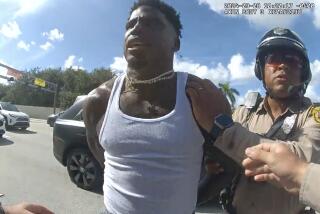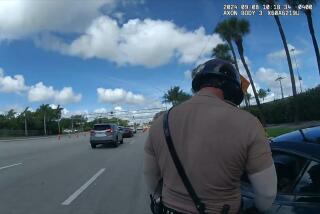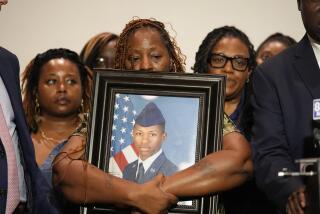Miami Officer Charged in Death That Sparked Riots
- Share via
MIAMI — Acting with unusual speed, authorities on Monday brought manslaughter charges against the Colombia-born policeman whose fatal shooting of a black motorcycle rider a week ago touched off fiery racial disturbances in the city.
The 29-year-old officer, William Lozano, was arrested and charged with two counts of manslaughter. Lozano was released on $10,000 bail after being booked into Miami’s Dade County Jail.
Lozano’s lawyers said the hasty action was politically motivated. Normally, authorities await the findings of a police review panel or a grand jury before filing charges against an officer. “Clearly, this is a political decision and not a legal decision,” Lozano attorney Roy Black said. “Obviously, he (Lozano) is very upset. He has been a police officer for four years and he has dedicated his life to law enforcement.”
Miami police spokesman Ray Lang said Officer Dawn Campbell, who was present when Lozano fired at the motorcycle, had given a complete statement to investigators. Dade County State Atty. Janet Reno said Lozano could face up to 60 years in prison and a $30,000 fine if found guilty on both charges.
The three days of rioting in the city’s Overtown and Liberty City neighborhoods underlined growing black-Latino tensions in predominantly Latino Miami, tensions aroused by black fears of losing further economic and political power to new waves of immigrants, most recently those from Nicaragua.
As city authorities moved against Lozano, two prosecutors from the Justice Department’s civil rights division were reportedly en route to Miami to begin a federal grand jury investigation of the shooting.
At the same time, an urgently formed special city panel of police officers and black local leaders who sought to subpoena Lozano to testify about the shooting complained that it had too little power to investigate the incident properly.
Lozano’s arrest came just hours after the funeral of Clement Lloyd, a 23-year-old car wash manager who was shot as he sped through Overtown on his motorcycle Jan. 16 with a passenger, Allan Blanchard, 24, behind him.
Reports From Witnesses
Initial police reports said that Lozano said he fired as the motorcycle bore down on him. Witnesses said Lozano stepped into the street and fired as Lloyd raced by, hitting him in the head. Blanchard, who had recently arrived from the Virgin Islands, was hurled into a car as the motorcycle crashed. He died hours later.
Lozano faces one manslaughter count in each death.
Lloyd was eulogized by his minister-uncle, the Rev. Morris Lloyd, at a largely family-attended funeral in the Bahman Avenue Church of God in Opa-locka, a neighboring Dade County municipality.
“As Martin Luther King said, we live together as rational human beings or die together as fools--not only in Miami but all over America,” he said. “Until something is done to correct our injustices, I believe a lot more lives are going to be lost.”
The Rev. Lloyd and the church’s pastor, the Rev. Dennis Archibald, pleaded for calm and peaceful solutions to the bitterness that sparked the rioting.
The areas that burst into turmoil hours after citywide celebrations of Dr. Martin Luther King Jr.’s birthday remained calm Monday, a week later, although a heavy police presence was still evident. During the three violent days, 11 people, including one policeman, were wounded by gunfire, none seriously. Damage, still untallied but probably exceeding $1 million in value, was done as buildings were burned and looted.
Miami moved quickly to impanel the 11-member independent review board of black leaders and police officers to investigate the Lloyd shooting and the underlying social problems of the poor and largely black Overtown neighborhood. Although the panel was given subpoena power to call witnesses, its members expressed frustration after their first meeting Monday, when a city attorney told them some of their most important witnesses can still refuse to testify.
City Atty. Jorge Fernandez said that because of coincidental state and federal investigations and a Florida statue protecting the rights of police officers, witnesses such as Lozano may not legally be forced to testify.
‘No Power at All’
“Then if we listen carefully to the . . . policeman’s bill of rights, we really have no power at all,” said the Rev. Richard Barry, the panel’s soft-spoken chairman.
The panel adjourned after deciding to appoint a legal counsel and a staff administrator before beginning its investigation.
Blacks have long complained that the growing economic and political power of immigrant Latinos has denied them a fair share of the city’s progress, as they lost jobs and business opportunities first to more affluent, better-educated Cuban immigrants in the 1960s, 1970s and early 1980s, and now to waves of immigrants from Central America, most recently Nicaragua.
The Dade County, Miami and Miami Beach police forces have been the focus of much of the black resentment. At present, the Miami police force is about 43% Latino and 17.6% black.
Complaints of police brutality had risen sharply from 368 cases in 1987 to 568 in the first three quarters of 1988.
More to Read
Sign up for Essential California
The most important California stories and recommendations in your inbox every morning.
You may occasionally receive promotional content from the Los Angeles Times.










